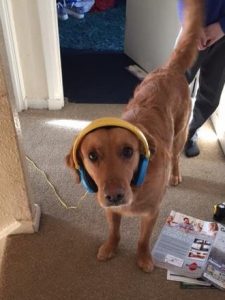Story of a Rescue Dog – Bonnie The Golden Retriever
05/01/2018
Giving a rescue dog a home reduces the pressure on overburdened rehoming centres as well as having its own rewards. However, a rescue dog with an unknown history can pose a real challenge to dog owners. We spoke to Vicki Trigg about the potential problems, hard work and rewards that can accompany a rescue dog. Vicki is the owner of rescued Golden Retriever, Bonnie.
 Could you tell us a bit more about Bonnie’s background?
Could you tell us a bit more about Bonnie’s background?
Bonnie was about 19 months when we got her. We initially thought she was younger as she was very small, but our vet managed to track down her initial vaccination record and and was able to estimate her birth date from that. We got her from Labrador Retriever Rescue Scotland (LRRSS). As the name suggests, they usually deal with Labs but they occasionally get other working dogs in as well. Bonnie’s route was quite unusual as she never went into the rescue itself. She originally belonged to a family in Inverness who couldn’t manage her, then went into foster. They couldn’t keep her long term so she ended up in kennels near Dunblane. She was there quite a while before the rescue discovered her and got in touch with me. Due to this, her behavioural issues weren’t noted as Carolyne, who runs the rescue, never actually met her.
It wasn’t until we had her for a little while that we realised she had some problems. She’d had minimal training, no recall training at all, she’s reactive to some other dogs and she’s incredibly hyperactive. She also has a very high prey drive, which is just fabulous when you live in an area surrounded by farmland! It’s very rare she can be allowed off lead, which is a shame as she’s got so much energy that she needs to run off. We think she spent an awful lot of time crated as a puppy as she goes up on her front paws and wees against a wall (like pandas wee on trees!) rather than squatting, which is indicative of her learning not to soil her sleeping area.
She’s also very small for a Golden and is consistently underweight no matter how much she eats. She’s got a clean bill of health so there’s nothing underlying. The vet just thinks she didn’t get the right food when she was growing. We also call her our Dory Dog as you give her a command and she’ll forget it straight away. This is very unusual for the breed, so it does look like she didn’t get everything she needed nutrient-wise as a pup.
What made you choose a rescue dog given your experience of owning your black Labrador Retriever, Layla, from a puppy?
I’m guessing it’s important when dealing with a rescue dog’s behavioural issues to avoid confusing them further. What has been the key to dealing with Bonnie and how successful do you feel it has been?
Many people with children or other pets worry about how well socialised a rescue dog could be. Was this a concern for you?
Responsible dog owners understand that training is an ongoing aspect of owning a dog. Roughly how much time do you spend training per week and how do you fit this in to your routine?
What are your thoughts on the effects of diet on behaviour?
I would advise anybody looking to rescue to make sure that they’re prepared for the long haul. There’s been times I’ve regretted adopting Bonnie as having her has changed our lifestyle. We can’t go for the long walks in the local area anymore as she can’t go off lead where there’s any livestock in the vicinity or where other dogs may surprise us suddenly. She has squeezed under fences and run across multiple fields to try to chase sheep which I thought were safely in the distance.
We can’t take the dogs to my mums as although she is fine with our cat (now!) she will chase unfamiliar cats, so we have to factor in kennel costs to any ‘flying visit’. We can no longer socialise with friends with dogs as we never know who she’ll have a problem with. She’s very highly strung and the complete opposite to Layla who is very chilled. She’s a lot better than she was but she’s still very hard work. If I were to rescue again I wouldn’t take a dog without knowing a bit more about it’s background as it’s been a steep learning curve.
Thank you so much for taking the time to share your story of your rescue dog, Bonnie.
Image courtesy of Vicki Trigg.


